Citizen Participation and Knowledge Support in Urban Public Energy Transition—A Quadruple Helix Perspective
Abstract
1. Introduction
2. Setting the Scene
3. Mapping Energy Knowledge on Rotterdam
4. Citizen Participation in Urban Energy Transition
- Citizen involvement in local changes in energy supply conditions is in agreement with democratic principles at local level.
- More citizen involvement may lead to more support for drastic interventions.
- Citizens are a rich source of information, so that listening to directly involved inhabitants may avoid mistakes in the preparation and implementation of energy plans.
- Creation of an “acceptance” attitude among citizens may avoid long-lasting juridical appeal procedures, and hence increase an effective implementation of new energy plans.
5. A Quadruple Helix Framework for Energy Transition Policy
6. Expert Opinion of Local Energy Brokers on Energy Transition: A Q-Analysis
- S1: Participating citizens should form a good representation of the city or district.
- S2: Citizens have confidence in the municipality.
- S3: The organisation of citizen participation is difficult.
- S4: Citizens need feedback after their input in a participation process.
- S5: A complex issue like energy transition needs solid prior knowledge.
- S6: The average citizen is hard to engage in a participation project.
- S7: Citizens wish a complete transparency during a participation project.
- S8: Citizens do not only wish to advice, but also to co-decide.
- S9: A strong district/neighbourhood community sense is beneficial for citizen participation.
7. Retrospect and Prospect
- Energy scoreboards on the local, district, street or individual dwelling stocks, in terms of relevant and available energy performance data (e.g., energy labels).
- Energy dashboards (e-compasses) on critical KPIs on energy use and expenditures, in terms of critical parameters (e.g., solar energy, housing insulation, inhouse adjustments).
- Digital twin tools, with a double function:
- -
- Decision-support visualisation tool for local or district sustainable, public energy policy (macro);
- -
- Three-dimensional information tool for familiarising citizens or business with possible options (images) for energy saving.
- Digital preference elicitation tool, for expressing and collecting the citizens’ views on energy issues in a systematic manner (e.g., MAMCA), with a view to:
- -
- Accountable citizen participation;
- -
- Underpinning of meso/macro energy policy at municipal level.
- A citizen-oriented financial cost–benefit analysis tool, for assisting citizens in solving complex choices on costly indoor energy adjustments.
- An operational transformation of spatial data infrastructure towards a digital twin energy infrastructure.
- Metaversal energy scenario experiments [68] on innovative initiatives among stakeholders in the energy domain, using existing information as the basis for a verisimilitude in future energy planning.
Author Contributions
Funding
Data Availability Statement
Acknowledgments
Conflicts of Interest
Appendix A
- Erasmus University Thesis Repository: Sturen naar de klimaatneutrale stad (eur.nl)
- Erasmus University Thesis Repository: Energie voor leefbare wijken: Onderzoek naar de koppelkansen tussen de warmtetransitie en het verbeteren van de leefbaarheid in kwetsbare wijken (eur.nl)
- Buurttransformator | Topsector Energie
- SNAP Neighbourhood Projects—Toronto and Region Conservation Authority (TRCA)
- Erasmus University Thesis Repository: Een Omgevingsagenda voor Zuid-Holland (eur.nl)
- Erasmus University Thesis Repository: Meerwaarde van co-creatie voor de Zeeuwse omgevingsvisie (eur.nl)
- https://thesis.eur.nl/pub/43817 (accessed on 1 March 2022).
- Erasmus University Thesis Repository: De energietransitie als kans; Hoe Kopenhagen partnerships toepast om het innovatievermogen te vergroten (eur.nl)
- Erasmus University Thesis Repository: Van klimaatdoelstelling in Parijs tot ‘achter de voordeur’ in Purmerend
- Erasmus University Thesis Repository: De Druk van het Klimaatakkoord: Hoe de Rotterdamse haven zich kan aanpassen om haar concurrentiepositie te behouden (eur.nl)
- Erasmus University Thesis Repository: De Rotterdamse haven: een koploper in de energietransitie (eur.nl)
- https://thesis.eur.nl/pub/32055, (accessed on 1 March 2022).
- Erasmus University Thesis Repository: Burgerparticipatie bij stedelijke vernieuwing in de gemeente Rotterdam (eur.nl)
- Erasmus University Thesis Repository: Burgerparticipatie binnen de pijlerprojecten binnen het Pact op Zuid (eur.nl)
- Linda-Schut-Burgerparticipatie-wat-doet-het-voor-de-woonomgeving.pdf
- Erasmus University Thesis Repository: Van Participatie naar Maximalisatie (eur.nl)
- Hiba-Amina.pdf
- Butt-Saqib.pdf
- Gao-Kun-Man.pdf
- Bastiaans-Marleen.pdf
- Dijkstra,_Aan-Age_1.docx (live.com, (accessed on 16 December 2022))
References
- Eckhardt, J.; Kaletka, C.; Krüger, D.; Maldonado-Mariscal, K.; Schulz, A.C. Ecosystems of Co-Creation. Front. Sociol. 2021, 26, 642289. [Google Scholar] [CrossRef]
- Leydesdorff, L.; Meyer, M. The Scientometrics of a Triple Helix of University-Industry-Government Relations (Introduction to the Topical Issue). Scientometrics 2007, 70, 207–222. [Google Scholar] [CrossRef]
- Carayannis, E.G.; Campbell, D.F. ‘Mode 3’ and ‘Quadruple Helix’: Toward a 21st Century Fractal Innovation Ecosystem. Int. J. Technol. Manag. 2009, 46, 201–234. [Google Scholar] [CrossRef]
- Carayannis, E.G.; Campbell, D.F.J. Triple Helix, Quadruple Helix and Quintuple Helix and How Do Knowledge, Innovation and the Environment Relate to Each Other? A Proposed Framework for a Trans-disciplinary Analysis of Sustainable Development and Social Ecology. Int. J. Soc. Ecol. Sustain. Dev. 2010, 1, 41–69. [Google Scholar] [CrossRef]
- MacGregor, S.P.; Marques-Gou, P.; Simon-Villar, A. Gauging Readiness for the Quadruple Helix: A Study of 16 European Organizations. J. Knowl. Econ. 2010, 1, 173–190. [Google Scholar] [CrossRef]
- Star 2012 ‘Quadruple Helix’ Way to Innovation. Available online: https://www.thestar.com.my/news/nation/2012/03/01/quadruple-helix-way-to-innovation (accessed on 16 December 2022).
- Campbell, D.F.; Carayannis, E.G.; Rehman, S.S. Quadruple Helix Structures of Quality of Democracy in Innovation Systems: The USA, OECD Countries, and EU Member Countries in Global Comparison. J. Knowl. Econ. 2015, 6, 467–493. [Google Scholar] [CrossRef]
- Grundel, I.; Dahlström, M. A Quadruple and Quintuple Helix Approach to Regional Innovation Systems in the Transformation to a Forestry-based Bioeconomy. J. Knowl. Econ. 2016, 7, 963–983. [Google Scholar] [CrossRef]
- Schütz, F.; Heidingsfelder, M.L.; Schraudner, M. Co-shaping the Future in Quadruple Helix Innovation Systems: Uncovering Public Preferences toward Participatory Research and Innovation. She Ji J. Des. Econ. Innov. 2019, 5, 128–146. [Google Scholar] [CrossRef]
- Yun, J.J.; Liu, Z. Micro-and Macro-Dynamics of Open Innovation with a Quadruple-Helix Model. Sustainability 2019, 11, 3301. [Google Scholar] [CrossRef]
- Irwin, A. Citizen science: A Study of People, Expertise and Sustainable Development (Environment and Society); Routledge: London, UK; New York, NY, USA, 1995. [Google Scholar]
- EC (European Commission). Science for Environment Policy In-Depth Report: Environmental Citizen Science; European Commission: Brussels, Belgium, 2013; Available online: https://ec.europa.eu/science-environment-policy (accessed on 16 December 2022).
- Haklay, M. Citizen Science and Policy: A European Perspective; Woodrow Wilson International Center for Scholars: Washington, DC, USA, 2015. [Google Scholar]
- Fritz, S.; See, L.; Carlson, T.; Haklay, M.; Oliver, J.L.; Fraisl, D.; Mondardini, R.; Brocklehurst, M.; Shanley, L.A.; Schade, S.; et al. Citizen Science and the United Nations Sustainable Development Goals. Nat. Sustain. 2019, 2, 922–930. [Google Scholar] [CrossRef]
- Kieslinger, B.; Schäfer, T.; Heigl, F.; Dörler, D.; Richter, A.; Bonn, A. The Challenge of Evaluation: An Open Framework for Evaluating Citizen Science Activities. SocArXiv 2017. [Google Scholar] [CrossRef]
- Hecker, S.; Haklay, M.; Bowser, A.; Makuch, Z.; Vogel, J.; Bonn, A. Innovation in Open Science, Society and Policy—Setting the Agenda for Citizen Science. In Citizen Science: Innovation in Open Science, Society and Policy; Hecker, S., Haklay, M., Bowser, A., Makuch, Z., Vogel, J., Bonn, A., Eds.; UCL Press: London, UK, 2018; Available online: http://www.jstor.org/stable/j.ctv550cf2.8 (accessed on 16 December 2022).
- Suman, B.A.; Pierce, R. Challenges for Citizen Science and the EU Open Science Agenda under the GDPR. Eur. Data Prot. Law Rev. 2018, 4, 284–295. [Google Scholar] [CrossRef]
- Turbé, A.; Barba, J.; Pelacho, M.; Mugdal, S.; Robinson, L.D.; Serrano-Sanz, F.; Sanz, F.; Tsinaraki, C.; Rubio, J.M.; Schade, S. Understanding the Citizen Science Landscape for European Environmental Policy: An Assessment and Recommendations. Citiz. Sci. Theory Pract. 2019, 4, 34. [Google Scholar] [CrossRef]
- Schade, S.; Pelacho, M.; van Noordwijk, T.; Vohland, K.; Hecker, S.; Manzoni, M. Citizen Science and Policy. In The Science of Citizen Science; Vohland, K., Land-Zandstra, A., Ceccaroni, L., Lemmens, R., Perelló, J., Ponti, M., Samson, R., Wagenknecht, K., Eds.; Springer: Cham, Switzerland, 2021; pp. 351–371. [Google Scholar]
- Cohn, J.P. Citizen Science: Can Volunteers Do Real Research? BioScience 2008, 58, 192–197. [Google Scholar] [CrossRef]
- Prats Lopez, M. Managing Citizen Science in the Humanities. PhD Thesis, Free University, Amsterdam, The Netherlands, 2017. [Google Scholar]
- Riesch, H.; Potter, C. Citizen Science as Seen by Scientists. Public Underst. Sci. 2014, 23, 107–120. [Google Scholar] [CrossRef]
- Wiggins, A.; Crowston, K. Surveying the Citizen Science Landscape. First Monday 2015, 20. [Google Scholar] [CrossRef]
- Afuah, A.; Tucci, C.L. Crowdsourcing as a Solution to Distant Search. Acad. Manag. Rev. 2012, 37, 355–375. [Google Scholar] [CrossRef]
- Batabyal, A.A.; Folmer, H. Spatial Economic Aspects of Climate Change. Spat. Econ. Anal. 2020, 15, 209–218. [Google Scholar] [CrossRef]
- Nordhaus, W.D. The Climate Casino; Yale University Press: New Haven, CN, USA; London, UK, 2013. [Google Scholar]
- Kythreotis, A.P.; Jonas, Q.E.G.; Howart, C. Locating Climate Adaption in Urban and Regional Studies. Reg. Stud. 2020, 54, 576–588. [Google Scholar] [CrossRef]
- Iturriza, M.; Harvantes, J.; Abdelgaured, A.A.; Labeka, L. Are Cities Aware Enough? A Framework for Developing City Awareness to Climate Change. Sustainability 2020, 12, 2168. [Google Scholar] [CrossRef]
- Botelho, D.F.; Dias, B.H.; de Oliveira, L.W.; Soares, T.A.; Rezande, L.; Sousa, T. Innovative Business Models as Drivers for Prosumers Integration. Renew. Sustain. Energy Rev. 2021, 144, 111057. [Google Scholar] [CrossRef]
- Tushar, W.; Yuen, C.; Saha, T.K.; Morstyn, T.; Chapman, A.C.; Alam, M.J.E.; Hanif, S.; Poor, H.V. Peer-to-Peer Energy Systems for Connected Communities. Appl. Energy 2021, 282, 116195. [Google Scholar] [CrossRef]
- Rahman, M.A.; Islam, A.; Esha, B.H.; Sultana, N.; Chakravorty, S. Consumer Buying Behavior towards Online Shopping: An Empirical Study on Dhaka City, Bangladesh. Cogent Bus. Manag. 2018, 5, 1514940. [Google Scholar] [CrossRef]
- Kourtit, K. The New Urban World; Shaker: Aachen, Germany, 2019. [Google Scholar]
- Kemp, R.; Rotmans, J. Transitioning Policy: Co-production of a New Strategic Framework for Energy Innovation Policy in the Netherlands. Policy Sci. 2009, 42, 303–322. [Google Scholar] [CrossRef]
- Rossi, A. The Architecture of the City; Oppositions Books; Mit Press: Cambridge, MA, USA, 1984. [Google Scholar]
- Hettinga, S.; Nijkamp, P.; Scholten, H.J. A Multi-stakeholder Decision Support System for Local Neighbourhood Energy Planning. Energy Policy 2018, 116, 277–288. [Google Scholar] [CrossRef]
- Qi, Q.; Tao, F. Digital Twin and Big Data Towards Smart Manufacturing and Industry 4.0: 360 Degree Comparison. IEEE Access 2018, 6, 3585–3593. Available online: https://ieeexplore.ieee.org/stamp/stamp.jsp?arnumber=8258937 (accessed on 16 December 2022). [CrossRef]
- Austin, M.; Delgoshaei, P.; Coelho, M.; Heidarinejad, M. Architecting Smart City Digital Twins: Combined Semantic Model and Machine Learning Approach. J. Manag. Eng. 2020, 36, 4020026. [Google Scholar] [CrossRef]
- Errandonea, I.; Beltrán, S.; Arrizabalaga, S. Digital Twin for Maintenance: A Literature Review. Comput. Ind. 2020, 123, 103316. [Google Scholar] [CrossRef]
- Voosen, P. Europe Builds ‘Digital Twin’ of Earth to Home Climate Forecasts. Science 2020, 370, 16–17. [Google Scholar] [CrossRef]
- Cioara, T.; Anghel, I.; Antal, M.; Salomie, I.; Antal, C.; Ioan, A.G. An Overview of Digital Twins Application Domains in Smart Energy Grid. arXiv 2021, arXiv:2104.07904. Available online: https://arxiv.org/abs/2104.07904 (accessed on 16 December 2022).
- Craglia, M.; Scholten, H.J.; Micheli, M.; Hradec, J.; Calzada, I.; Luitjens, S.; Ponti, M.; Boter, J. Digitranscope: The Governance of Digitally-transformed Society; EUR 30590 EN; Publications Office of the European Union: Luxembourg, 2021; ISBN 978-92-76-30229-2. [Google Scholar] [CrossRef]
- Nijkamp, P.; Rietveld, P.; Voogd, H. Multicriteria Evaluation in Physical Planning; North Holland: Amsterdam, The Netherlands, 1990; pp. 65–100. [Google Scholar]
- Macharis, C.; de Witte, A.; Ampe, J. The Multi-actor, Multi-criteria Analysis Methodology (MAMCA) for the Evaluation of Transport Projects: Theory and Practice. J. Adv. Transp. 2009, 43, 183–202. [Google Scholar] [CrossRef]
- Macharis, C.; Baudry, G. Decision-Making for Sustainable Transport and Mobility: Multi Actor Multi Criteria Analysis; Edward Elgar Publishing: Cheltenham, UK, 2018. [Google Scholar]
- Tillie, N.; Dobbelsteen, A.; van den Doepel, D.; de Jager, W.; Joubeek, M.; Mayenburg, D. REAP Rotterdam Energy Approach and Planning: Towards CO2-Neutral Urban Development; Duurzaamuitgeven.nl: Rotterdam, The Netherlands, 2009. [Google Scholar]
- Bovenhoff, B. Omgevingsgericht Leiderschap; Solo Ta Hari Publishing: Schiedam, The Netherlands, 2022. [Google Scholar]
- Corvers, F. Designing ‘Context-Specific’ Regional Innovation Policy. Ph.D. Thesis, Leiden University, Leiden, The Netherlands, 2019. [Google Scholar]
- Kiss, B.; Sekulova, F.; Hörschelmann, K.; Salk, C.F.; Takahashi, W.; Wamsler, C. Citizen Participation in the Governance of Nature-based Solutions. Environ. Policy Gov. 2022, 32, 247–272. [Google Scholar] [CrossRef]
- Monnikhof, R.A.H.; Edelenbos, J. Into the Fog? Stakeholder Input in Participatory Impact Assessment. Impact Assess. Proj. Apprais. 2001, 19, 23–39. [Google Scholar] [CrossRef]
- Brandsen, T.; Honingh, M. Definitions of co-production and cocreation. In Co-Production and Co-Creation. Engaging Citizens in Public Services; Brandsen, T., Verschuere, B., Steen, T., Eds.; Routledge: New York, NY, USA, 2018; pp. 9–17. [Google Scholar]
- Jones, P. Contexts of co-creation: Designing with system stakeholders. In Systemic Design. Theory, Methods, and Practice; Jones, P., Kijima, K., Eds.; Springer: Tokyo, Japan, 2018; pp. 3–52. [Google Scholar]
- Huttunen, S.; Ojanen, M.; Ott, A.; Saarikoski, H. What about Citizens? A Literature Review of Citizen Engagement in Sustainability Transitions Research. Energy Res. Soc. Sci. 2022, 91, 102714. [Google Scholar] [CrossRef]
- ESPON The Territorial and Urban Dimensions of the Digital Transition of Public Services. Luxembourg. 2020. Available online: https://www.espon.eu/digital-transition (accessed on 1 March 2022).
- Berawi, M.A. The Role of Industry 4.0 in Achieving Sustainable Development Goals. Int. J. Technol. 2019, 10, 644–647. [Google Scholar] [CrossRef]
- Oztemel, E.; Gursey, S. Literature Review of Industry 4.0 and Related Technologies. J. Intell. Manuf. 2020, 31, 127–182. [Google Scholar] [CrossRef]
- Borowski, P.F. Digitization, Digital Twins, Blockchain, and Industry 4.0 as Elements of Management Process in Enterprises in the Energy Sector. Energies 2021, 14, 1885. [Google Scholar] [CrossRef]
- Ghobakhloo, M.; Fathi, M. Industry 4.0 and Opportunities for Energy Sustainability. J. Clean. Prod. 2021, 295, 126427. [Google Scholar] [CrossRef]
- Kourtit, K.; Macharis, C.; Nijkamp, P. A Multi-Actor Multi-Criteria Analysis of the Performance of Global Cities. Appl. Geogr. 2014, 49, 24–36. [Google Scholar] [CrossRef]
- Barry, J.; Proops, J. Seeking Sustainability Discourses with Q Methodology. Ecol. Econ. 1999, 28, 337–345. [Google Scholar] [CrossRef]
- Doody, D.G.; Kearney, P.; Barry, J.; Moles, R.; O’Regan, B. Evaluation of the Q-Method as a Method of Public Participation in the Selection of Sustainable Development Indicators. Ecol. Indic. 2009, 9, 1129–1137. [Google Scholar] [CrossRef]
- Jedeloo, S.; Staa, A. Q-methodologie, een Werkelijke Mix van Kwalitatief en Kwantitatief Onderzoek. KWALON. Tijdschr. Voor Kwal. Onderz. Ned. 2009, 14, 5–15. [Google Scholar] [CrossRef]
- Brannstrom, C. A Q-Method Analysis of Environmental Governance Discourses in Brazil’s Northeastern Soy Frontier. Prof. Geogr. 2011, 63, 531–549. [Google Scholar] [CrossRef]
- Kampen, J.K.; Tamás, P. Overly Ambitious: Contributions and Current Status of Q methodology. QualQuant 2014, 48, 3109–3126. [Google Scholar] [CrossRef]
- Gretchen Sneegas, G.; Sydney, B.; Brannstrom, C.; Jepson, W.; Lee, K.; Seghezzo, L. Using Q-methodology in Environmental Sustainability Research: A Bibliometric Analysis and Systematic Review. Ecol. Econ. 2021, 180, 106864. [Google Scholar] [CrossRef]
- Raadgever, G.T.; Mostert, E.; van de Giesen, N.C. Measuring Perspectives on Future Flood Management on The Rhine: Application and Discussion of Q Methodology. Hydrol. Earth Syst. Sci. Discuss. 2008, 5, 437–474. Available online: https://hess.copernicus.org/preprints/5/437/2008/hessd-5-437-2008.pdf (accessed on 1 January 2023).
- Cross, R.M. Exploring Attitudes: The Case for Q methodology. Health Educ. Res. 2005, 20, 206–213. [Google Scholar] [CrossRef]
- Kilpeläinen, S.; Aalto, P.; Toivanen, P.; Lehtonen, P.; Holttinen, H. How to Achieve a More Resource-Efficient and Climate-Neutral Energy System by 2030? Views of Nordic Stakeholders. Rev. Policy Res. 2019, 38, 272. [Google Scholar] [CrossRef]
- Meta. Welcome to Meta, Meta. Available online: https://about.meta.com/%20meta/ (accessed on 19 December 2021).
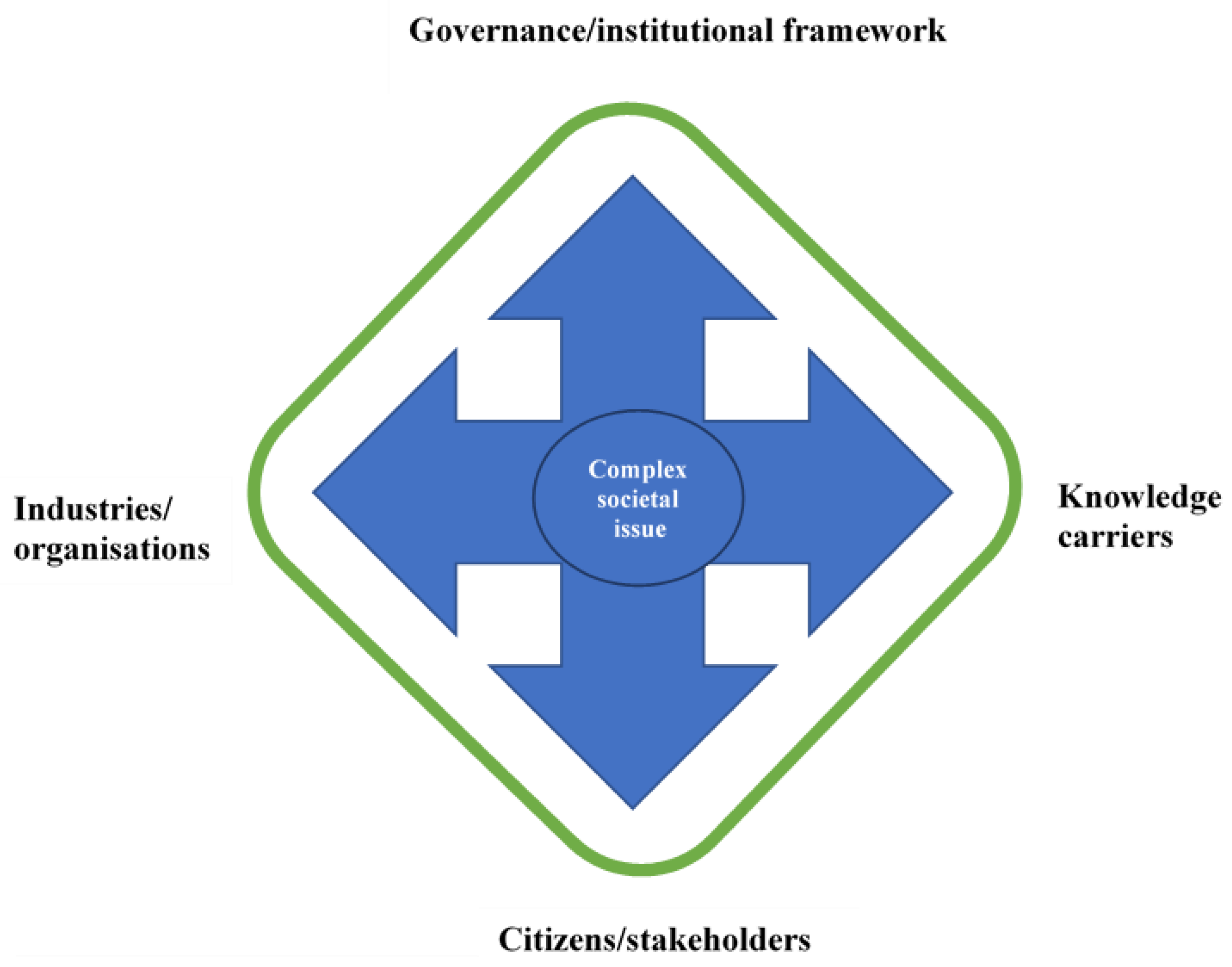

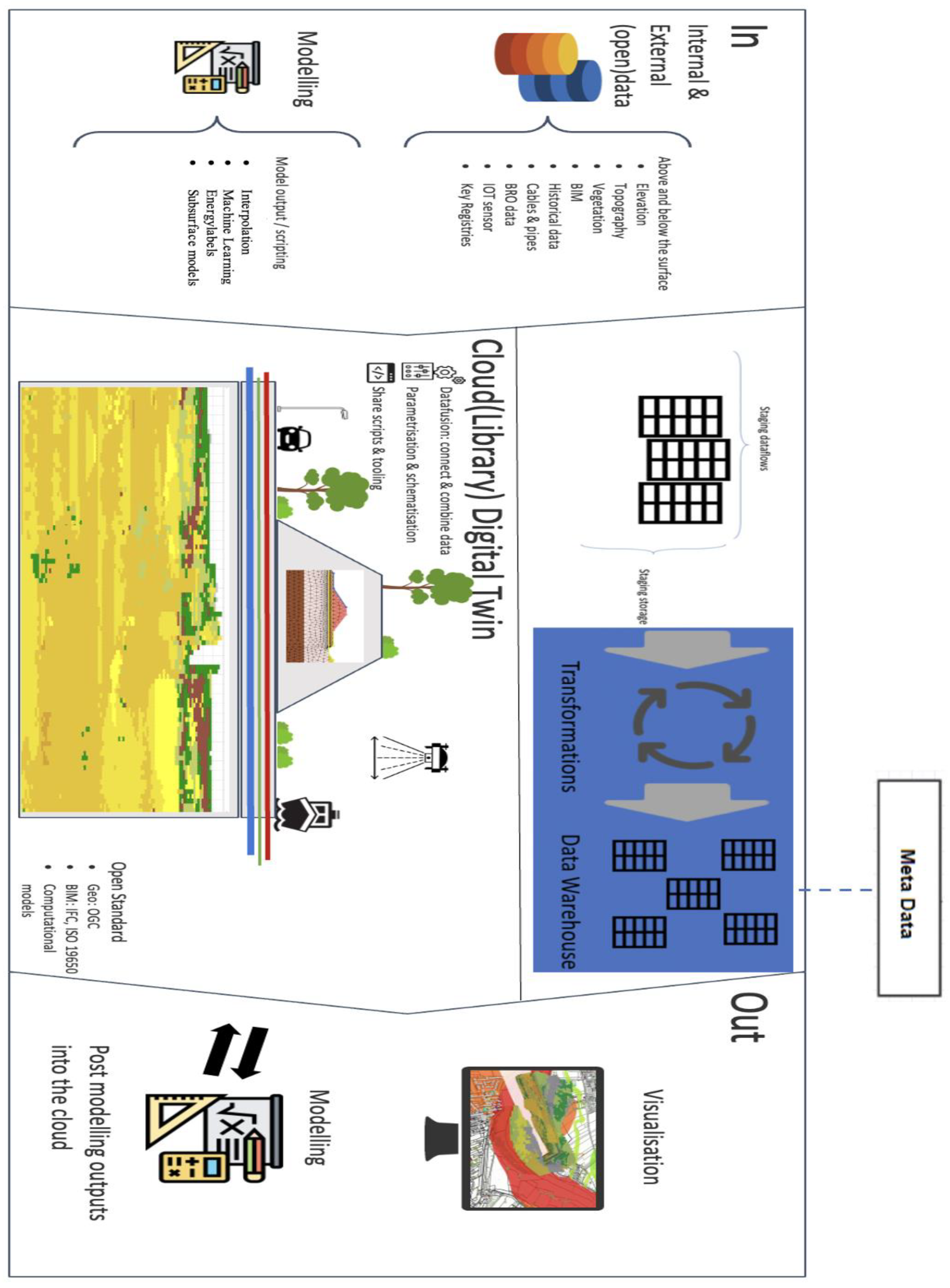
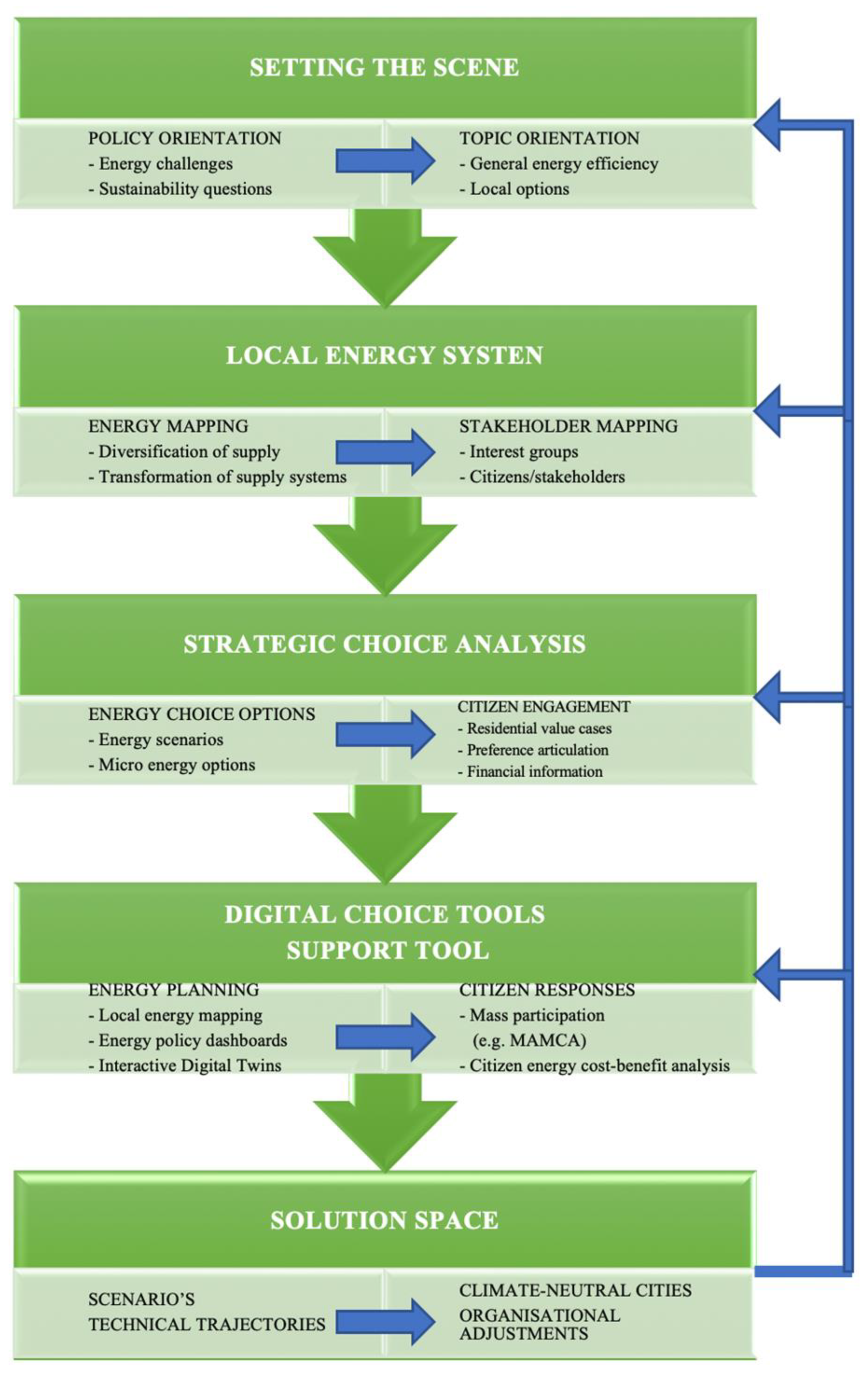
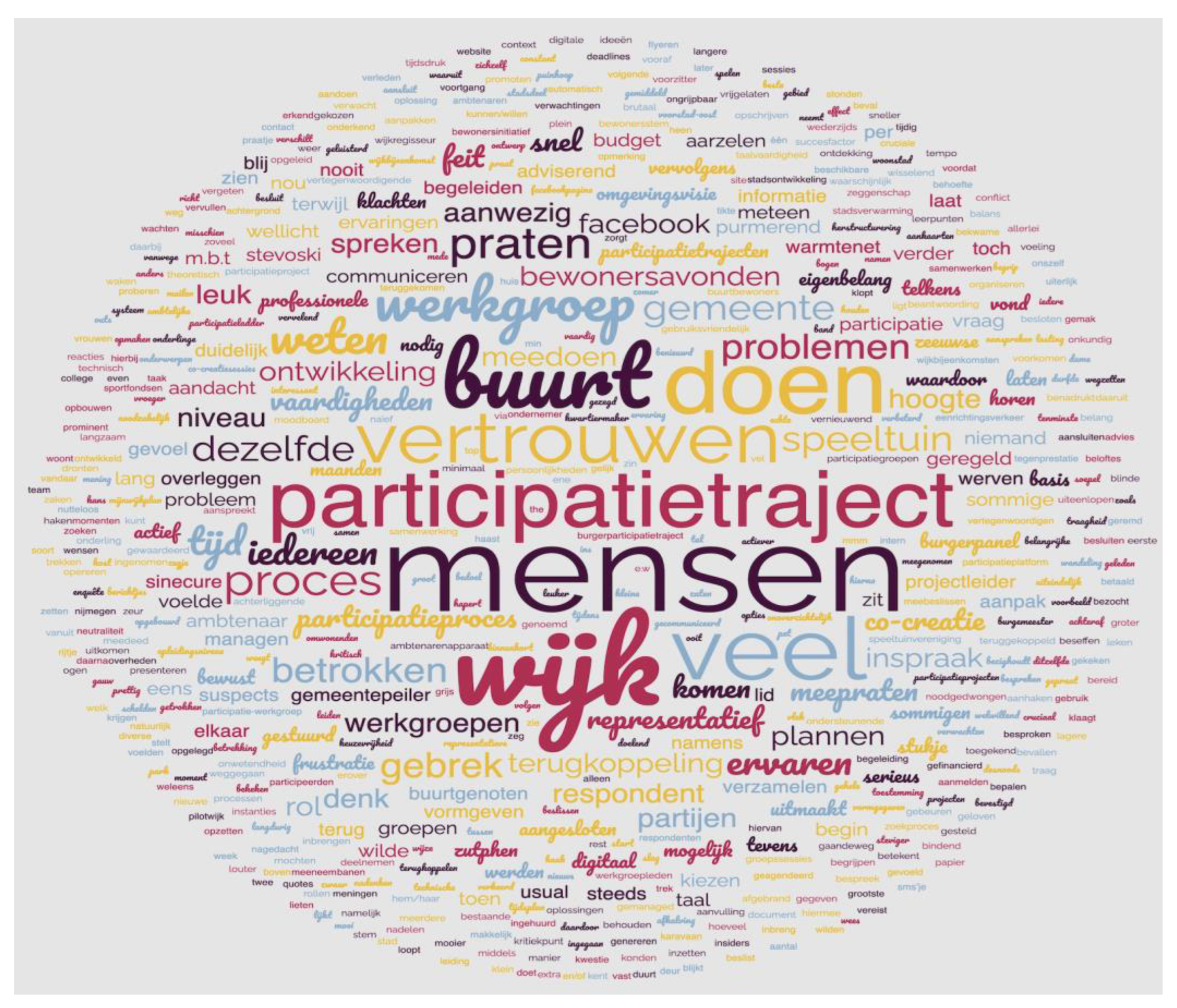

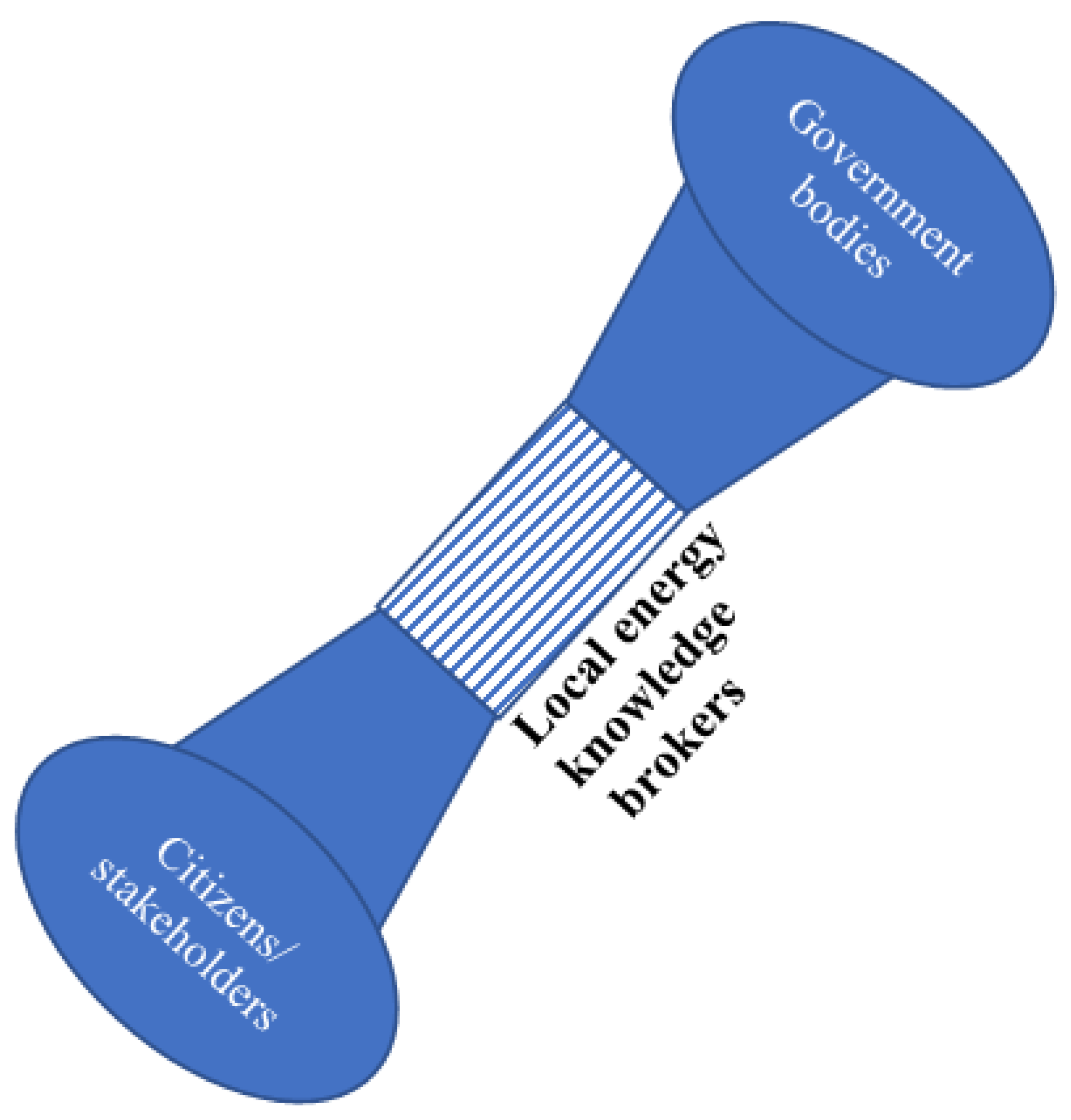
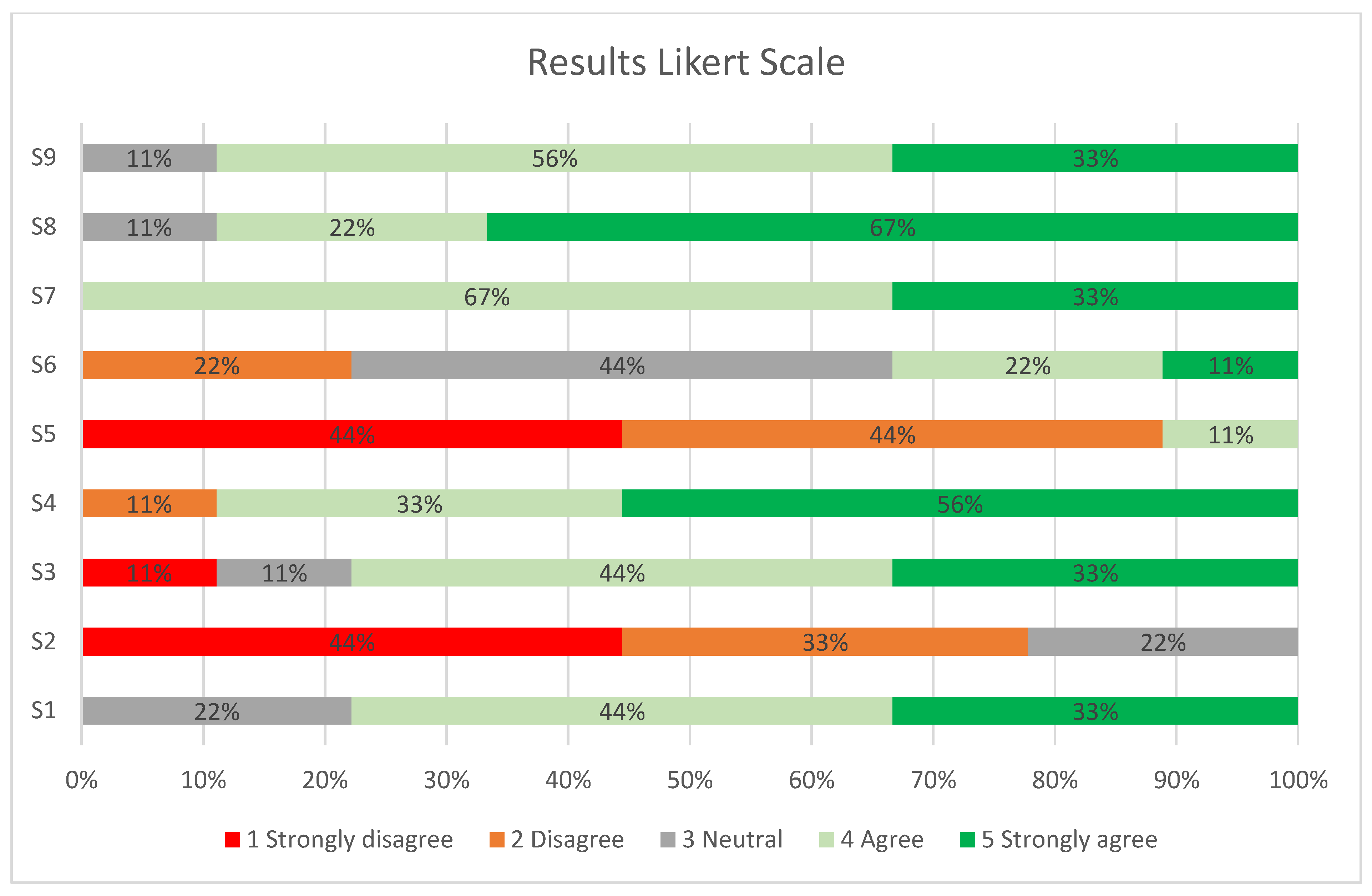
| Participation Goal | Participation Description | Participation Method |
|---|---|---|
| Informing | The local government informs the citizens of decisions and policies. Citizens do not provide input. | Information evening, debate, campaign. |
| Consulting | Politics decide the policy direction. Citizens take part in conversations about policy. | Citizen panel, survey, focus group. |
| Advising | Politics let the citizen formulate problems and solutions. The ideas of citizens have a full role in policymaking. | Citizen jury, advisory board, neighbourhood platform. |
| Co-producing | Politics and citizens together discuss problems and solutions. | Consultation group, project group, work atelier. |
| Co-deciding | Citizens decide about policymaking. Politics take over the results with specific adaptations. | Binding referendum |
| Componente | Value for Individual Responses | 1 | 2 | 3 | 4 | 5 | 6 | 7 | 8 | 9 | |
|---|---|---|---|---|---|---|---|---|---|---|---|
| 1 | Statement 1 | 5 | 4 | 5 | 5 | 4 | 4 | 3 | 3 | 4 | |
| Respondent1 | 0.979 | Statement 2 | 3 | 1 | 1 | 1 | 3 | 2 | 1 | 2 | 2 |
| Respondent2 | 0.950 | Statement 3 | 4 | 1 | 4 | 4 | 5 | 5 | 5 | 4 | 3 |
| Respondent3 | 0.976 | Statement 4 | 4 | 5 | 5 | 4 | 5 | 4 | 5 | 5 | 2 |
| Respondent4 | 0.991 | Statement 5 | 2 | 1 | 1 | 2 | 1 | 2 | 1 | 2 | 4 |
| Respondent5 | 0.986 | Statement 6 | 3 | 2 | 5 | 3 | 3 | 4 | 3 | 2 | 4 |
| Respondent6 | 0.990 | Statement 7 | 5 | 4 | 5 | 4 | 4 | 4 | 4 | 4 | 5 |
| Respondent7 | 0.981 | Statement 8 | 3 | 4 | 5 | 5 | 5 | 4 | 5 | 5 | 5 |
| Respondent8 | 0.986 | Statement 9 | 4 | 5 | 3 | 5 | 4 | 4 | 5 | 4 | 4 |
| Respondent9 | 0.951 |
Disclaimer/Publisher’s Note: The statements, opinions and data contained in all publications are solely those of the individual author(s) and contributor(s) and not of MDPI and/or the editor(s). MDPI and/or the editor(s) disclaim responsibility for any injury to people or property resulting from any ideas, methods, instructions or products referred to in the content. |
© 2023 by the authors. Licensee MDPI, Basel, Switzerland. This article is an open access article distributed under the terms and conditions of the Creative Commons Attribution (CC BY) license (https://creativecommons.org/licenses/by/4.0/).
Share and Cite
Nijkamp, P.; Kourtit, K.; Scholten, H.; Willemsen, E. Citizen Participation and Knowledge Support in Urban Public Energy Transition—A Quadruple Helix Perspective. Land 2023, 12, 395. https://doi.org/10.3390/land12020395
Nijkamp P, Kourtit K, Scholten H, Willemsen E. Citizen Participation and Knowledge Support in Urban Public Energy Transition—A Quadruple Helix Perspective. Land. 2023; 12(2):395. https://doi.org/10.3390/land12020395
Chicago/Turabian StyleNijkamp, Peter, Karima Kourtit, Henk Scholten, and Esmeralda Willemsen. 2023. "Citizen Participation and Knowledge Support in Urban Public Energy Transition—A Quadruple Helix Perspective" Land 12, no. 2: 395. https://doi.org/10.3390/land12020395
APA StyleNijkamp, P., Kourtit, K., Scholten, H., & Willemsen, E. (2023). Citizen Participation and Knowledge Support in Urban Public Energy Transition—A Quadruple Helix Perspective. Land, 12(2), 395. https://doi.org/10.3390/land12020395








